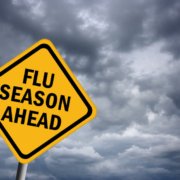Here’s What to Know About the Flu Shot
By Andrea Klock MSN, FNP-C | Family Nurse Practitioner
It’s that time of year again: Flu Season. Most people are familiar with the influenza (flu) vaccination and thankfully many of us receive a shot every year. With the current focus on COVID and that vaccine, it’s still very important to protect ourselves and each other from the flu.
Because the flu vaccine has been common for years, a lot of people don’t know the facts about the vaccine, like and why a yearly shot is necessary as compared to receiving a series or booster like the COVID vaccine.
Common Flu Vaccine Questions Answered
Why is the flu vaccine so important?
The CDC estimates that on average 3 – 11% of the population in the United States contract influenza yearly. But this number only reflects symptomatic patients who got tested for influenza. The percentage is higher when including persons who did not have symptoms or didn’t see a provider for a test.
Who is at high risk for problems if they catch the flu?
Those who are considered high risk for more serious complications if they get the flu include people who are 65 years or older, have a cancer diagnosis, are pregnant, have chronic medical conditions, or are young children.
When is the flu season?
Although the influenza virus can be detected at any time during the year, the peak infection time starts in the fall and goes through the winter months.
Why do I need the flu vaccine every year?
The influenza virus changes – mutates – every year creating new strains every flu season. The vaccine is restructured every year to provide the best possible coverage from new strains.
Can receiving the flu vaccination cause you to get the flu?
No – the flu vaccine is made with an inactivated virus or single protein (very small part) from the virus. Any reactions that mimic the flu after receiving the vaccination are our own body’s immune response.
How do I prevent catching the flu?
Along with getting the flu shot, the best way to prevent getting sick is to avoid others that are sick. A lot of what we did to slow COVID helps slow the flu too, like cover coughs and sneezes, wash your hands, and disinfect surfaces that may have been contaminated with the influenza virus. Always stay home from work, school, and other activities when sick to keep it from spreading to others.
Did you get your flu shot yet? Make an appointment with your NOAH provider today and get protected from the flu this season.







